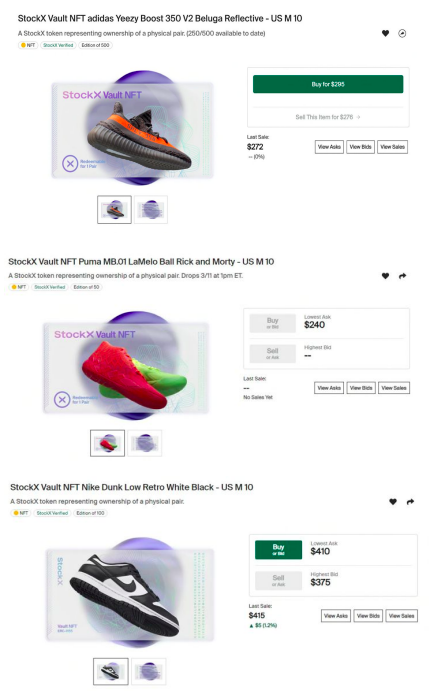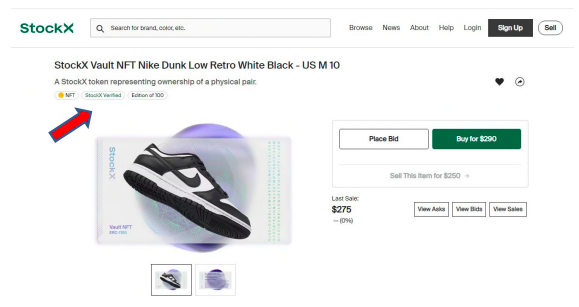The Nike vs. StockX lawsuit could determine what kind of NFT could be created
Dubbed “Sneaker Wars,” Nike’s ongoing lawsuit against online shoe retailer StockX is likely to illustrate how intellectual property law is enforced in the NFT. A lawsuit filed by Nike in February 2022 alleges that StockX was involved in the unauthorized and infringing use of Nike’s famous signs in its Vault N.
FT CollectionWho is StockX?
Launched in 2016, StockX is an online reseller sneaker retailer However, its subsidiaries allow business people to sell other items – designer clothes, Pokemon trading cards, PlayStation 5 consoles and more.
As of 2021, the company is valued at more than 3.8 billion. And this “authenticity guarantee” process sets it apart from its competitors, including eBay. As described in the legal documents, StockX’s proprietary, multi-step authentication process “ensures that items traded on StockX comply with the product description and condition standards advertised by StockX, and the products offered for sale are what they claim, and not. Duplicate, defective or used. “
When a user buys a pair of shoes from StockX’s website, the seller sends the shoes to one of StockX’s authentication facilities in the United States or abroad. For “verified” sneakers they are then sent to the buyer by StockX, where according to StockX, those who fail the authenticity test are returned to the seller, removing StockX from liability.
In January 2022, StockX launched its Vault NFT collection, with each NFT in the vault attached to a physical item that StockX sells – in this case, Nike’s Jordan 1 sneaker.
Nike logo may be missing?
In its 50-page complaint, Nike specifically alleges that StockX is creating NFTs using Nike’s trademarks, capitalizing on Nike’s goodwill and, as a result, misleading customers into “unquestionably increasing customer value”.
Hermès Int’l v. In contrast to the Rothschild case, the situation seems to be different as StockX argues that its vault NFTs are not “virtual products” or “digital sneakers”. Rather, each vault NFT is bound by a specific physical good that has already been certified by StockX, including “the style of shows originally created and sold by Nike, Adidas and Puma.” It further describes its vault NFT collection as simply a “key” for accessing the item stored in the vault, without any other underlying value.
Speaking directly to Nike’s allegations of trademark infringement, StockX argued in its March 31 response that it was “fair use”, saying it was “no different from major e-commerce retailers and marketplaces that sell product sneakers and other products for sale and Uses details, which consumers see every day (and don’t get confused).
The answer marks Nike’s allegations as nothing more than a “baseless and misleading attempt” to intervene in a new technology that Nike does not understand, which has opened up a second market for the sale of StockX’s sneakers and other products.

Similar to the rule of law in the heart Hermes, The Lanham Act and the Second Circuits Rogers Examination also serve as legal standards, which set the traditional boundaries for intellectual property and trademark infringement. Under Rogers, The use of a trademark in an artistic work is effective only if it is a sign (1) has no “artistic relevance” to the underlying work or (2) clearly confuses the source or content of the work.
Nike has filed two new claims – fake and false advertising
Earlier this month, Nike corrected its earlier allegations, adding two new claims – fake and false advertising. Since December 2021, Nike has stated that it has successfully purchased four pairs of imitation Air Jordan 1 Retro High OGs in black / varsity red-and-white color from the Vault NFT collection in StockX.
In other words, these fake pair of sneakers were labeled “StockX Verified”, somehow passing a company-owned “authentication guarantee,” which Nike says constitutes false advertising.

Against Nike’s allegations, StockX said on its website that the company “takes consumer protection very seriously” and that Nike’s latest demands were nothing more than a “baseless attempt” to “revive its lost legal case”.
It also said in a statement that Nike’s internal brand protection team also praised the company’s authentication program, where “hundreds of Nike employees – including current senior executives – use StockX to buy and sell products.”
What does this mean for NFTs?
The ongoing lawsuit examines the relationship between a retailer and a manufacturer, raising new questions about the type of NFT that can be created and how a “fair use” defense can be applied. So far, it’s rare that our landscape has seen a scene where a manufacturer sues a retailer for selling counterfeit products.
The closest comparison to Nike’s ongoing lawsuit against StockX is the 2011 class-action lawsuit where Coach sued his former employee Gina Kim, who the company claimed was selling counterfeit coach bags on Ebay (minus the use of NFTs). Another example is the 2004 lawsuit in which Tiffany sued eBay for trademark infringement in its alleged role in reselling counterfeit Tiffany jewelry (again, without using NFTs).
Ultimately, our courts are once again facing another opportunity to set a legal precedent on how intellectual property is applied in the NFT.
For more information on this, please contact Nike, Inc. v. See StockX LLC, 1: 22-CV-00983-VEC
Andrew Rosso is an attorney and journalist who focuses on fintech and intellectual property law.
.
https://ift.tt/hCvMmxk
Related Posts
- Wax Blockchain Game Forge Arena on Epic Game Store
- Next: Five to watch in October 2022
- Linagee Name Registry: What to Know About Oldest Ethereum NFT Contracts
- Ethermail partners with Toxic Skulls Club to enable wallet-to-wallet communication with NFT holders
- HUGO Partners with Imaginary to Launch Exclusive NFT Collection | NFT Culture | Web3 Culture NFTs and Crypto Art | Platforms and projects
- VeeFriends x Macy’s x Toys “R” Us Exclusive Physical Collectibles Launch
Post a Comment
Post a Comment